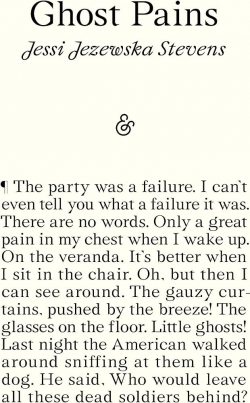The particular landscape of Jessi Jezewska Stevens’ first collection, Ghost Pains, recalls echoes of the “New Aesthetic,” a term coined back in 2012 to describe the leakage of the digital realm into the physical world. Characters point their phones at the sky, “as if to image-search the constellations,” travel by way of reading reviews on Google Maps: “His laptop was an oyster open to the world. Escape was almost always possible.” They watch YouTube performances of classical musicians in lieu of going out to the theater, read the Wiki version of the story of John the Baptist: “It’s all too extreme in the Bible.” A couple embarks on a road trip, (“He’d autoreplied his .org inbox; she, her .edu.”), despite the fact that “millions of millennials were reluctant to leave the coasts, had never even Googled Yellowstone.” One character boasts that she can “go weeks without speaking to anyone but Ann and the cashiers at the BioMarkt. And occasionally my phone. What a stupid woman, Siri must think, who has to ask for directions all the time.” Throughout Ghost Pains, Stevens’ characters are caught not only between the physical and digital, but also one country and the next, the past and the future, between wanting to know and wanting to forget. This, as they say, is where the haunting happens—when a ghost is stuck between two worlds, unable to pass from one realm to the next. This same sense of dislocation haunts the aching, alluring stories of Ghost Pains, summoning phantoms of all kinds.
Most of the collection’s stories follow Americans abroad—in locales such as Berlin, Krakow, Tuscany—and explore their inability to truly assimilate, despite even the greatest desires to shirk the place they came from. “Perhaps I owe this rootless mood to the country my passport says I’m from,” remarks the narrator of “Dispatches from Berlin”, “a nation forever staring into other people’s pantries, reaching in an arm.” The narrator of “The Party,” one particular standout of the collection, admires the beautiful ceiling of her Berlin apartment: “You could never afford a ceiling like that in America now, I thought. Not unless you were born beneath it.” She deems the empty glasses left abandoned after the titular party “little ghosts!” and remarks, “Last night the American walked around sniffing at them like a dog. He said, Who would leave all these dead soldiers behind? I couldn’t say. I am American as well, but lately I haven’t been feeling quite myself.” In “Weimar Whore,” the central character finds herself utterly enamored with Germany’s distant past and falls into an anachronistic lifestyle, stewing cabbages and darning her socks, decking herself out lace-up ankle boots and wool skirts even in eighty-seven degree weather: “The truth was she’d overdosed on the media of the inter-war period. She couldn’t keep both feet in the now.” Later, she confides to a psychiatrist: “I’m beginning to feel…like it’s everyone else who’s nuts.” In the title story, a character takes the lingering pain of a hack-job nipple piercing as a cosmic sign to leave her city, and accepts a job transfer to Poland, where she searches for “nostalgia of a type that didn’t really belong to her.” She reminisces on some of her grandfather’s last words, that “being American meant she didn’t have to dwell so much in the past.” But, she wants to know, “couldn’t they have also dwelt a little more?”
By contrast, the characters in the few U.S.-based stories long to free themselves from the past, despite its inescapable omnipresence. After viewing the specter of the eponymous battlegrounds —recalling the memory of actual dead soldiers, after the colloquial, metaphorical versions we encounter in “The Party”—the characters of “Gettysburg” reflect that, “It really was a beautiful country, as long as you had no memory.” In “Duck Duck Orange Juice,” a college student goes to interview a musician on the upcoming election at his solitary residence out in the country, and muses that “there’s no more to news, the news is old and yet cannot be thrown away.” The rural settings of the U.S. stories offer a stark contrast to the glamor of the cosmopolitan foreign locales, and evoke some of the most palpable feelings of haunting in the collection.
Throughout Ghost Pains, characters vacillate between yearning to extricate themselves from the past and to return to it, but “Honeymoon,” another crown jewel of the collection, offers one example of a narrator who relishes the in-between rather than trying to escape it. Evoking a similar sense of martial ambivalence as in Stevens’ excellent first novel, The Exhibition of Persephone Q, a newlywed narrator on her Tuscan honeymoon longs for her life before marriage: “What I truly missed was being engaged. Now there’s a vacation.” Stevens shines her brightest in the first-person, and “Honeymoon” is a true masterclass in narrative voice. Even in an ostensible paradise, the narrator reminisces on “those early months of courtship, when everything was still uncertain…It seems to me there is something lost to those hour-long train rides. The thrill of the ask. The space.” In Ghost Pains Stevens proves herself an expert cartographer of that space lying open wide in each story, undaunted by its ambiguous infinity.
A compelling collection that’s sure to linger, by an exquisite stylist of psychological fiction.

